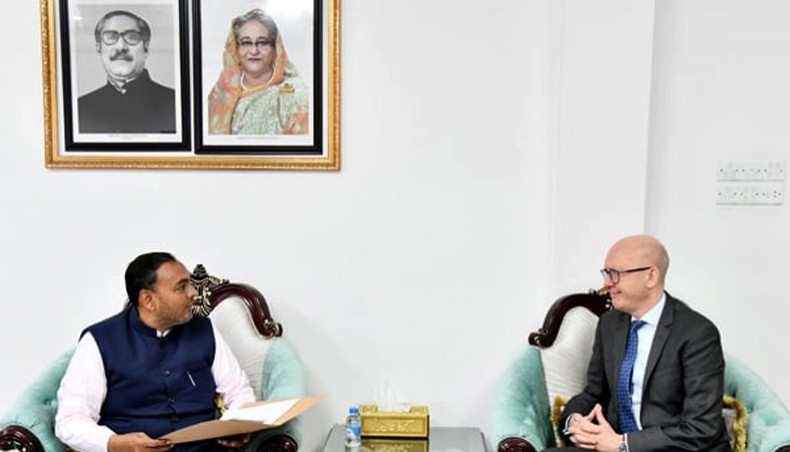

— BSS photo
State minister for commerce Ahsanul Islam on Monday urged the European Union and the United Kingdom to invest in Bangladesh’s potential sectors, including jute, jute-made goods, leather, leather products and handicrafts.
Ahsanul made the request when EU ambassador to Bangladesh Charles Whiteley and UK high commissioner to Bangladesh Sarah Cooke paid courtesy call on him separately at his office at Secretariat, said a press release.
Mentioning that Bangladesh is working on export diversification with special importance, he said that prime minister Sheikh Hasina had given instructions to promote jute and jute-made goods as well as leather and leather-made products.
Besides, the prime minister has declared handicrafts as the product of the year for 2024.
In this regard, the state minister called upon the EU and UK to invest in these sectors.
Apart from jute and leather products, he emphasized working in joint ventures to increase efficiency, capacity and improve the quality of pharmaceuticals, especially in API sector, agro processing, sea food, light engineering, health, bicycle, frozen food and in agricultural products.
Ahsanul said that the import and export policies are being made time-befitting through removing trade and regulatory related barriers to expand trade and attracting more foreign direct investment in the country.
Besides, the Bangladesh Investment Development Authority is creating a favourable environment for investment in various sectors of the country In addition to providing a one-stop service for the investors.
Referring to the beginning of the Dhaka International Trade Fair 2024, Ahsanul said that this year there was a plan to ensure visits to the fair by the heads of all foreign missions and trade/commercial counsellors located in Bangladesh.
Mentioning that this DITF is the biggest event for the display of local products in the world, he said that there were also many foreign pavilions at the fair.
‘Branding of Bangladeshi products will be possible through the visit of the mission officials at the fair,’ he added.
The state minister for commerce also urged both the EU and the UK to go for contract manufacturing of those products in Bangladesh which the country has to import from the EU and the UK.
Noting that Bangladesh is now being regarded as a good place for making investment in the world, he mentioned that many countries are now investing in 100 designated special economic zones in Bangladesh.
Apart from the economic zones, all kinds of facilities will be provided to the investors by the government for the establishment of industrial factories, he said.
During the meeting, the state minister for commerce sought the cooperation of the EU and the UK for lending necessary support to the position of the less developed countries, including Bangladesh, in the upcoming ministerial conference organised by the World Trade Organisation to be held in Abu Dhabi on February 26-29.
British high commissioner Sarah Cooke said that the United Kingdom was a long-standing and time-tested friend of Bangladesh while both countries were now enjoying excellent relations.
In addition to development cooperation, she also emphasised partnership in terms of economic and trade cooperation. In order to create skilled manpower, the UK high commissioner expressed her resolve to work jointly to strike balance in the certification and accreditation of higher education in the health sector, including doctors, nurses and engineers.
Besides, Cooke emphasised the removal of regulatory barriers, simplification of service procedures, enforcement and protection of intellectual property rights and liberalization in competition in Bangladesh.
Lauding the facilities provided by the government for attracting foreign investment, EU ambassador Charles Whiteley expressed his interest in investing in various sectors of Bangladesh, including the pharmaceuticals and IT sectors.
Commerce ministry senior secretary Tapan Kanti Ghosh and senior officials were present.






